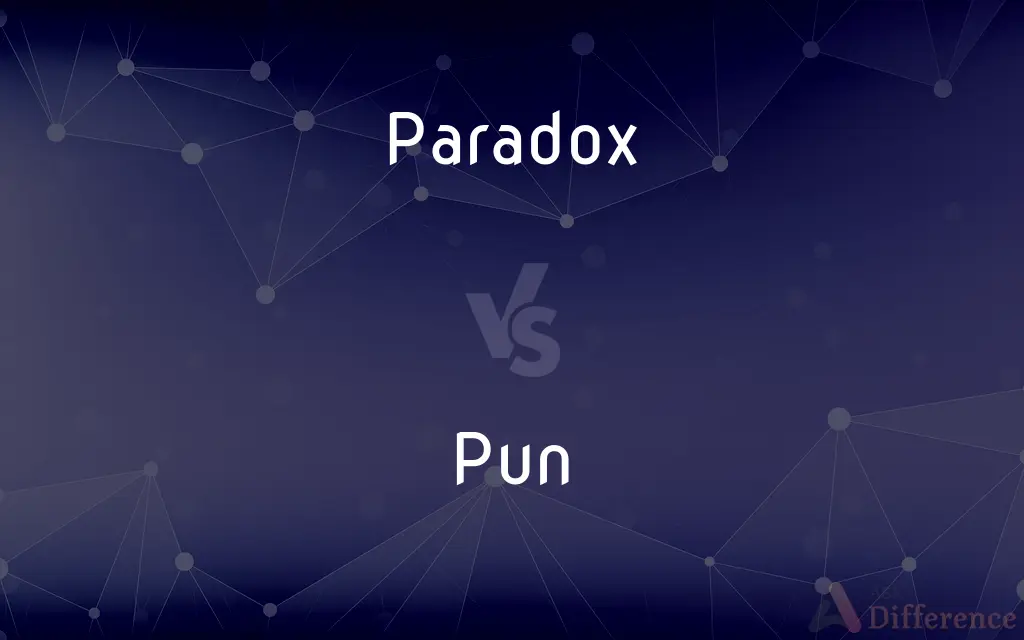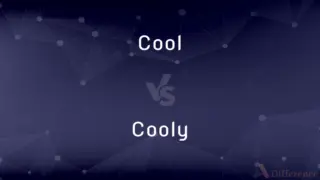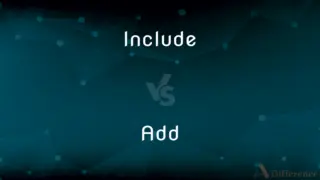Paradox vs. Pun — What's the Difference?
By Fiza Rafique & Maham Liaqat — Updated on March 19, 2024
A paradox is a statement that contradicts itself or defies common sense yet might hold truth, while a pun is a play on words exploiting multiple meanings or similarities in sound for humor or rhetorical effect.

Difference Between Paradox and Pun
Table of Contents
ADVERTISEMENT
Key Differences
A paradox presents an apparent contradiction that challenges our understanding or expectations, often leading to a deeper insight or a reevaluation of what we consider to be true. On the other hand, a pun is crafted for linguistic amusement, relying on wordplay to elicit laughter, highlight ambiguities, or enhance the richness of language.
While the purpose of a paradox is to provoke thought, stimulate philosophical inquiry, or illustrate complex truths in a succinct manner, the pun aims to entertain, using cleverness and linguistic dexterity to create a humorous or insightful effect. This distinction underscores the different intentions behind their use.
Paradoxes often appear in literature, philosophy, and scientific discourse, where they serve as tools for exploring contradictions within logic, ethics, or the natural world. Puns, conversely, are more commonly found in everyday language, comedy, literature, and advertising, serving to lighten the mood or draw attention through wit.
The complexity of a paradox lies in its conceptual challenge and the intellectual engagement it demands from the audience. In contrast, the ingenuity of a pun lies in its linguistic creativity and the immediate cognitive pleasure it provides through the recognition of dual meanings or sounds.
Puns can be a component of a paradox when the paradoxical statement involves a play on words, but not all paradoxes contain puns. Similarly, while puns can occasionally lead to paradoxical interpretations, their primary function remains entertainment rather than philosophical or rhetorical exploration.
ADVERTISEMENT
Comparison Chart
Definition
A statement that contradicts itself or defies common sense but may hold truth
A play on words exploiting multiple meanings or similarities in sound
Purpose
To provoke thought and illustrate complex truths
To entertain and amuse through wordplay
Context
Literature, philosophy, science
Everyday language, comedy, advertising
Intellectual Engagement
High, requires contemplation
Lower, aimed at quick cognitive recognition and amusement
Use of Language
Conceptual and challenging
Linguistic and humorous
Examples
"This statement is false."
"Time flies like an arrow; fruit flies like a banana."
Compare with Definitions
Paradox
A seemingly absurd statement that might reveal a deeper truth.
Less is more.
Pun
Exploits homophones for comedic effect.
I used to be a baker, but I couldn't make enough dough.
Paradox
Challenges conventional wisdom, leading to new insights.
The only constant is change.
Pun
A humorous play on words with multiple meanings.
A bicycle can't stand alone because it is two-tired.
Paradox
Encourages deeper analysis of apparent contradictions.
The beginning of the end.
Pun
Enhances advertising and branding with clever wordplay.
Our watch repairs are timeless.
Paradox
Appears in philosophical debates and theoretical discussions.
Can God create a stone so heavy that He cannot lift it?
Pun
Adds levity and wit to literature and speeches.
Santa's helpers are known as subordinate Clauses.
Paradox
Used to question assumptions and provoke thought.
I know that I know nothing.
Pun
Often used for comic relief or to highlight word ambiguities.
An eggcellent pun.
Paradox
A statement that seems to contradict itself but may nonetheless be true
The paradox that standing is more tiring than walking.
Pun
The pun, also known as paronomasia, is a form of word play that exploits multiple meanings of a term, or of similar-sounding words, for an intended humorous or rhetorical effect. These ambiguities can arise from the intentional use of homophonic, homographic, metonymic, or figurative language.
Paradox
A paradox is a logically self-contradictory statement or a statement that runs contrary to one's expectation. It is a statement that, despite apparently valid reasoning from true premises, leads to a seemingly self-contradictory or a logically unacceptable conclusion.
Pun
A play on words, sometimes on different senses of the same word and sometimes on the similar sense or sound of different words.
Paradox
A seemingly absurd or contradictory statement or proposition which when investigated may prove to be well founded or true
The uncertainty principle leads to all sorts of paradoxes, like the particles being in two places at once
Pun
To make puns or a pun.
Paradox
A person, thing, or situation that exhibits inexplicable or contradictory aspects
"The silence of midnight, to speak truly, though apparently a paradox, rung in my ears" (Mary Shelley).
Pun
(transitive) To beat; strike with force; to ram; to pound, as in a mortar; reduce to powder, to pulverize.
Paradox
A statement that is self-contradictory or logically untenable, though based on a valid deduction from acceptable premises.
Pun
(intransitive) To make or tell a pun; to make a play on words.
We punned about the topic until all around us groaned.
Paradox
An apparently self-contradictory statement, which can only be true if it is false, and vice versa.
"This sentence is false" is a paradox.
Pun
A joke or type of wordplay in which similar definitions or sounds of two words or phrases, or different definitions of the same word, are deliberately confused.
Paradox
A counterintuitive conclusion or outcome.
It is an interesting paradox that drinking a lot of water can often make you feel thirsty.
Pun
: a Korean unit of length equivalent to about 0.3{{nbsp}}cm.
Paradox
A claim that two apparently contradictory ideas are true.
Not having a fashion is a fashion; that's a paradox.
Pun
To pound.
He would pun thee into shivers with his fist.
Paradox
A thing involving contradictory yet interrelated elements that exist simultaneously and persist over time.
Pun
To make puns, or a pun; to use a word in a double sense, especially when the contrast of ideas is ludicrous; to play upon words; to quibble.
Paradox
A person or thing having contradictory properties.
He is a paradox; you would not expect him in that political party.
Pun
To persuade or affect by a pun.
Paradox
An unanswerable question or difficult puzzle, particularly one which leads to a deeper truth.
Pun
A play on words which have the same sound but different meanings; an expression in which two different applications of a word present an odd or ludicrous idea; a kind of quibble or equivocation.
A better put on this word was made on the Beggar's Opera, which, it was said, made Gay rich, and Rich gay.
Paradox
(obsolete) A statement which is difficult to believe, or which goes against general belief.
Pun
A humorous play on words;
I do it for the pun of it
His constant punning irritated her
Paradox
(uncountable) The use of counterintuitive or contradictory statements (paradoxes) in speech or writing.
Pun
Make a play on words;
Japanese like to pun--their language is well suited to punning
Paradox
A state in which one is logically compelled to contradict oneself.
Paradox
The practice of giving instructions that are opposed to the therapist's actual intent, with the intention that the client will disobey or be unable to obey.
Paradox
A tenet or proposition contrary to received opinion; an assertion or sentiment seemingly contradictory, or opposed to common sense; that which in appearance or terms is absurd, but yet may be true in fact.
A gloss there is to color that paradox, and make it appear in show not to be altogether unreasonable.
This was sometime a paradox, but now the time gives it proof.
Paradox
(logic) a self-contradiction;
`I always lie' is a paradox because if it is true it must be false
Common Curiosities
What makes a paradox different from a contradiction?
A paradox contains elements of contradiction but typically offers a hidden or unexpected truth, whereas a direct contradiction involves mutually exclusive statements with no reconciling truth.
Is a paradox always false?
Not necessarily. A paradox may seem false or contradictory on the surface but often encourages deeper reflection to uncover a non-obvious truth.
How do paradoxes contribute to scientific discovery?
Paradoxes in science often highlight gaps or inconsistencies in current understanding, prompting further investigation and potentially leading to breakthroughs or paradigm shifts.
Are all puns humorous?
While puns are primarily designed for humor, they can also serve rhetorical purposes or highlight linguistic intricacies without necessarily eliciting laughter.
Is it easier to create a pun than a paradox?
Creating a pun might be considered easier in terms of immediate linguistic play, but crafting a clever, contextually appropriate pun can be as challenging as formulating a meaningful paradox.
Can a pun be part of a paradox?
Yes, a pun can be part of a paradox when the paradoxical statement uses wordplay to highlight its contradictory elements.
Are puns a sign of intelligence?
Puns can be indicative of linguistic intelligence and creativity, as they require an understanding of language nuances, vocabulary, and the ability to make connections between seemingly unrelated concepts.
Can puns be used in serious contexts?
While puns are primarily associated with humor, they can be used in serious contexts to highlight word ambiguities, enhance rhetorical effects, or convey complex ideas in a memorable way.
What are the different types of puns?
Puns can be classified into various types, including homophonic puns (playing on words that sound alike), homographic puns (using words that are spelled the same but have different meanings), and compound puns (which involve multiple layers of wordplay).
How do puns function in advertising?
In advertising, puns are used to create catchy, memorable slogans or brand names that play on words to convey product benefits, evoke positive feelings, or differentiate the brand in a witty manner.
What is an example of a famous paradox in history?
One famous historical paradox is the "Liar Paradox," which is exemplified by the statement, "I am lying." If the statement is true, then the speaker is lying, making the statement false, and vice versa.
Do paradoxes play a role in mathematics?
Yes, paradoxes are significant in mathematics, where they often highlight inconsistencies or unforeseen implications within set theory, logic, or other foundational aspects, leading to important developments and clarifications.
Why do some people dislike puns?
Some people might dislike puns because they find them overly simplistic, groan-worthy, or distracting from serious topics. The appreciation of puns often depends on personal taste, cultural context, and the situation in which they are used.
How do paradoxes function in literature?
In literature, paradoxes are often used to express complexities in human nature, challenge readers' perceptions, or convey the depth of a character's experience in a concise manner.
Can paradoxes be solved or explained?
Some paradoxes can be resolved or explained through philosophical inquiry, scientific research, or linguistic analysis, while others remain open to interpretation or serve to illustrate limitations in our understanding.
Why are paradoxes important in philosophy?
Paradoxes are crucial in philosophy because they challenge established norms, prompt critical thinking, and stimulate debate on fundamental concepts such as truth, existence, and knowledge.
Share Your Discovery

Previous Comparison
Cool vs. Cooly
Next Comparison
Include vs. AddAuthor Spotlight
Written by
Fiza RafiqueFiza Rafique is a skilled content writer at AskDifference.com, where she meticulously refines and enhances written pieces. Drawing from her vast editorial expertise, Fiza ensures clarity, accuracy, and precision in every article. Passionate about language, she continually seeks to elevate the quality of content for readers worldwide.
Co-written by
Maham Liaqat















































